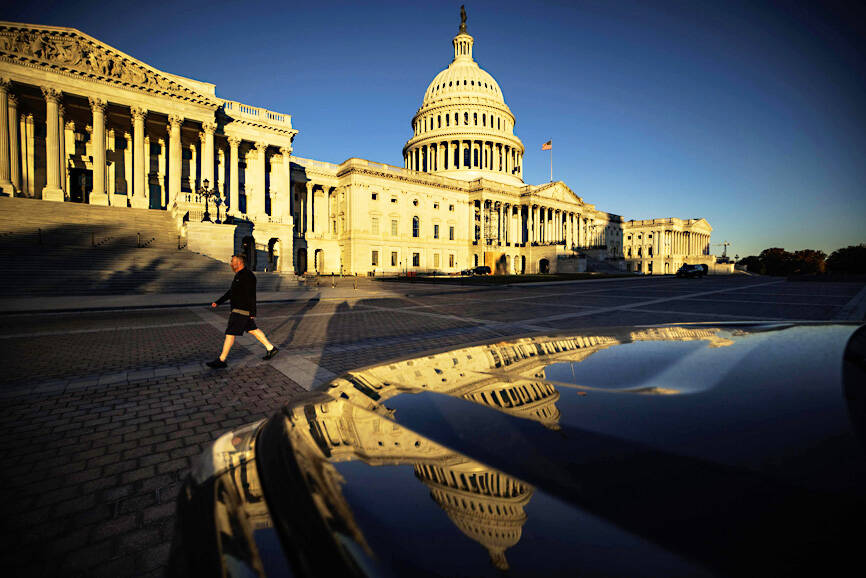The US Congress on Thursday unveiled an annual defense budget bill containing stipulations for establishing a comprehensive training, advising and institutionalized capacity-building program for Taiwan.
The US House and Senate armed services committees proposed the National Defense Authorization Act (NDAA) for the 2024 fiscal year via a reconciliation process.
The draft act is to be deliberated by the two chambers of the US Congress and then handed to US President Joe Biden for approval if passed by lawmakers.

Photo: AFP
The bill stipulates that the comprehensive training, advising and capacity-building program should be established by the US Secretary of Defense with the approval of the Secretary of State in consultation with Taiwanese officials.
The program’s aims include enabling a layered defense by Taiwanese armed forces in support of an asymmetric warfare strategy, encouraging information sharing and improving interoperability between the militaries of Taiwan and the US.
These goals additionally include improving Taiwan’s joint warfare capabilities, and enhancing the nation’s professional military education and civilian control of its military, the draft states.
The act urges the US Department of Defense to train Taiwanese armed forces to make use of transferred defense articles and services, reform and integrate their reserve forces and integrate military forces and civilian capabilities.
Furthermore, the US should facilitate the development of cyberwarfare defense capabilities and practices by Taiwan, and the nation’s participation in bilateral and multilateral military exercises, it says.
The secretary of defense is directed to provide congressional committees with a report on the Taiwanese military’s absorption of capabilities furnished by the US over the past decade, it said, adding that this report is to be made within 90 days of the NDAA’s enactment.
Top US defense and intelligence officials are required to make a report within 180 days of the NDAA’s enactment to the House and Senate’s select intelligence committees on the risks and implications of a sustained military blockade of Taiwan by China, it states.
This report should address the means China could use to realize such a blockade, identify the indicators and warnings of a military blockade and put forward a time line, it says.
The report should additionally address the coercive means China might use in conjunction with a blockade, including the takeover of Taiwan’s outlying islands, the negative impact of the blockade on Taiwan and the US and military challenges posed by it, the draft says.
The report should furnish an assessment of the US armed forces’ capabilities for countering a military blockade of Taiwan, identify areas for improvement and potential use of allies and partners in such an event, it says.

CLASH OF WORDS: While China’s foreign minister insisted the US play a constructive role with China, Rubio stressed Washington’s commitment to its allies in the region The Ministry of Foreign Affairs (MOFA) yesterday affirmed and welcomed US Secretary of State Marco Rubio statements expressing the US’ “serious concern over China’s coercive actions against Taiwan” and aggressive behavior in the South China Sea, in a telephone call with his Chinese counterpart. The ministry in a news release yesterday also said that the Chinese Ministry of Foreign Affairs had stated many fallacies about Taiwan in the call. “We solemnly emphasize again that our country and the People’s Republic of China are not subordinate to each other, and it has been an objective fact for a long time, as well as

‘CHARM OFFENSIVE’: Beijing has been sending senior Chinese officials to Okinawa as part of efforts to influence public opinion against the US, the ‘Telegraph’ reported Beijing is believed to be sowing divisions in Japan’s Okinawa Prefecture to better facilitate an invasion of Taiwan, British newspaper the Telegraph reported on Saturday. Less than 750km from Taiwan, Okinawa hosts nearly 30,000 US troops who would likely “play a pivotal role should Beijing order the invasion of Taiwan,” it wrote. To prevent US intervention in an invasion, China is carrying out a “silent invasion” of Okinawa by stoking the flames of discontent among locals toward the US presence in the prefecture, it said. Beijing is also allegedly funding separatists in the region, including Chosuke Yara, the head of the Ryukyu Independence

UNITED: The premier said Trump’s tariff comments provided a great opportunity for the private and public sectors to come together to maintain the nation’s chip advantage The government is considering ways to assist the nation’s semiconductor industry or hosting collaborative projects with the private sector after US President Donald Trump threatened to impose a 100 percent tariff on chips exported to the US, Premier Cho Jung-tai (卓榮泰) said yesterday. Trump on Monday told Republican members of the US Congress about plans to impose sweeping tariffs on semiconductors, steel, aluminum, copper and pharmaceuticals “in the very near future.” “It’s time for the United States to return to the system that made us richer and more powerful than ever before,” Trump said at the Republican Issues Conference in Miami, Florida. “They

GOLDEN OPPORTUNITY: Taiwan must capitalize on the shock waves DeepSeek has sent through US markets to show it is a tech partner of Washington, a researcher said China’s reported breakthrough in artificial intelligence (AI) would prompt the US to seek a stronger alliance with Taiwan and Japan to secure its technological superiority, a Taiwanese researcher said yesterday. The launch of low-cost AI model DeepSeek (深度求索) on Monday sent US tech stocks tumbling, with chipmaker Nvidia Corp losing 16 percent of its value and the NASDAQ falling 612.46 points, or 3.07 percent, to close at 19,341.84 points. On the same day, the Philadelphia Stock Exchange Semiconductor Sector index dropped 488.7 points, or 9.15 percent, to close at 4,853.24 points. The launch of the Chinese chatbot proves that a competitor can